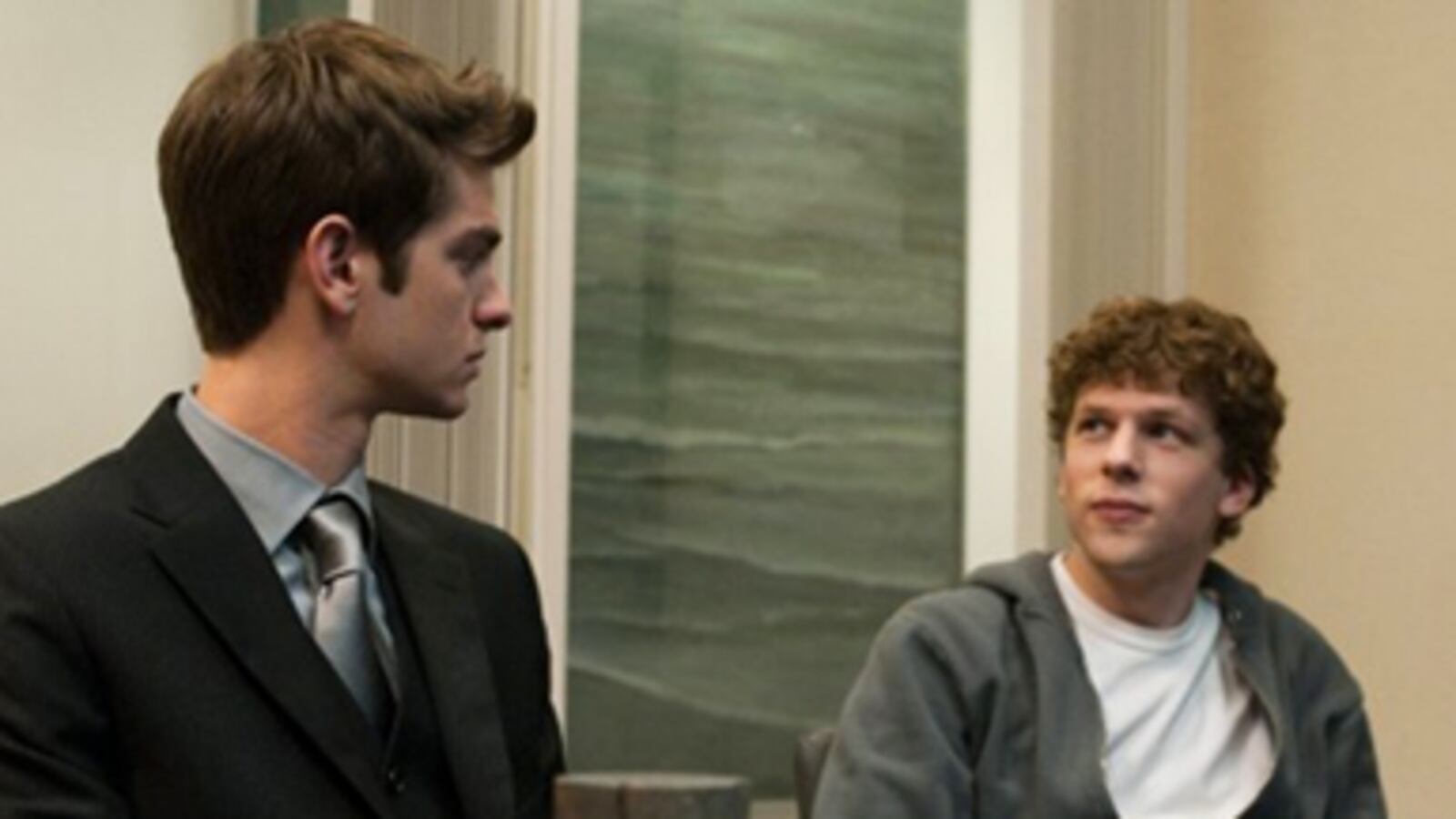On the evening of Sunday, February 27, the Academy of Motion Picture Arts and Sciences should do the right thing and honor The Social Network over The King’s Speech with the Best Picture Oscar, lest they risk further alienating the younger generation of movie fans who have caught on to the Oscars’ blandness and predictability. This lack of imagination is one of the reasons why TV ratings for Hollywood’s biggest night have dropped precipitously from a high of 57.25 million viewers in 1998—the year Titanic cleaned up at the awards—to just 41.3 million in 2010, despite nominating 10 films for the Best Picture Oscar instead of five.

There is a tried-and-true formula to courting Oscar, of course. Of the 50 films nominated for Best Picture from 2000 to 2009, close to 60 percent of them were set in the historical past; 15 of them centered on historical subjects; several took place during or around World War II; and, as is the Academy’s wont, many of the subjects were forced to come to terms with a disability of some kind, from schizophrenia ( A Beautiful Mind) to reverse-aging ( The Curious Case of Benjamin Button). The Academy, the 6,000-plus-strong club that votes for the Oscar winners, tends to skew older, leading to its oft-criticized reputation for choosing handsome, inoffensive films over edgier fare.
This year’s frontrunner for the Best Picture Oscar, scoring a whopping 12 nominations, is The King’s Speech. It’s a fact-based parlor drama about King George VI (Colin Firth), who, with the help of his eccentric Australian speech therapist Lionel Logue (Geoffrey Rush), must conquer his debilitating stutter if he’s to deliver a galvanizing speech declaring war against Hitler and Nazi Germany. It’s a handsome, meticulously crafted costume drama with a cast full of veteran actors (Micahel Gambon, Derek Jacobi, et al.) and anchored by Colin Firth’s emasculating, award-worthy performance as the line-flubbing monarch. That being said, several characters are reduced to silly stereotypes—Guy Pearce’s Edward VIII as the selfish, taunting brother and Timothy Spall’s Winston Churchill as the King’s Boy Friday, for starters; Tom Hooper’s direction is painfully obvious at times, choosing to shoot the king through a series of fisheye lenses (’cause he’s living in a fish bowl, get it?); the film boasts awful CGI crowd shots; and, last but not least, it shamelessly abides by virtually every rule in the Oscar playbook.
In short, The King’s Speech is vintage Harvey Weinstein, purveyor of award-friendly indiewood films. From 1993 to 2003, Weinstein’s Miramax Films had at least one film in the running for the Best Picture Oscar, and took home the movie industry’s biggest prize three times, for: The English Patient, Shakespeare in Love, and Chicago. That these are three of the more dubious Best Picture winners in Academy Awards history is no mere coincidence, although perhaps the fact that two of them starred Colin Firth is.
The Social Network, on the other hand, provides more than just a “Monarchs, they’re just like us!” message. The story of Harvard undergrad Mark Zuckerberg (Jesse Eisenberg), a nerdy, socially withdrawn computer programmer who, with the help of Machiavellian playboy—and visionary—Sean Parker (Justin Timberlake) goes on to create the world’s preeminent social network, Facebook, is a work of artful ambiguity, as well as a stunning representation of the zeitgeist. Director David Fincher and screenwriter Aaron Sorkin have merged their conflicting ideologies—Fincher has always championed the anarchic outsider, whereas Sorkin is a proud Luddite—to create a film, and a protagonist, that doesn’t force you to take sides, but instead presents a paradoxical world much like the one we live in, where, thanks in no small part to social networks like Facebook, everyone is at once more communicative, and more detached.
Yes, the Harvard lore is comically embellished—although many of these scenes are what Zuckerberg imagines would be happening, according to Sorkin—and, with the exception of Zuckerberg’s ex-girlfriend, played by Rooney Mara, female characters are few and far between. Moreover, several critics of the film have pointed out that it is a fictionalized, somewhat hostile parody of the Facebook founder; a film à clef, so to speak.
The Social Network provides more than just a “Monarchs, they’re just like us!” message.
Sure, as is Orson Welles’ portrait of William Randolph Hearst in Citizen Kane. Like Kane, The Social Network eschews traditional linear, chronological narrative to tell its tale largely through a series of courtroom scene flashbacks enlivened by lightning fast, whip-smart dialogue that rivals Howard Hawks’ His Girl Friday in sheer energy and brio. The film also dips into Greek tragedy when it confronts a loss of humanity. The “Rosebud” in this story is Eduardo Saverin (Andrew Garfield), Zuckerberg’s former best friend and Facebook’s co-founder, as well as Erica Albright (Mara), his ex-girlfriend—two obstacles that the programmer must leave in the dust in order to achieve his unique vision. Garfield’s character in particular, as the Fredo-like former friend who was passed over, provides some soul amid the litany of lawsuits and computer code.
Thanks to Sorkin’s mile-a-minute screenplay, Fincher’s methodical direction, honing in on the pivotal moments for dramatic effect, the eerie, ambient soundtrack by Trent Reznor and Atticus Ross, and Eisenberg’s mesmerizing turn as the poker-faced protagonist, The Social Network is just so thrillingly alive, and promulgates the Charles J. Sykes quote, incorrectly attributed to Bill Gates, that has proved strikingly prescient: “Be nice to nerds. Chances are you’ll end up working for one.”
Marlow Stern works for The Daily Beast and has a master's from the Columbia University Graduate School of Journalism. He has served in the editorial department of Blender magazine, as an editor at Amplifier magazine, and, since 2007, editor of Manhattan Movie Magazine.






